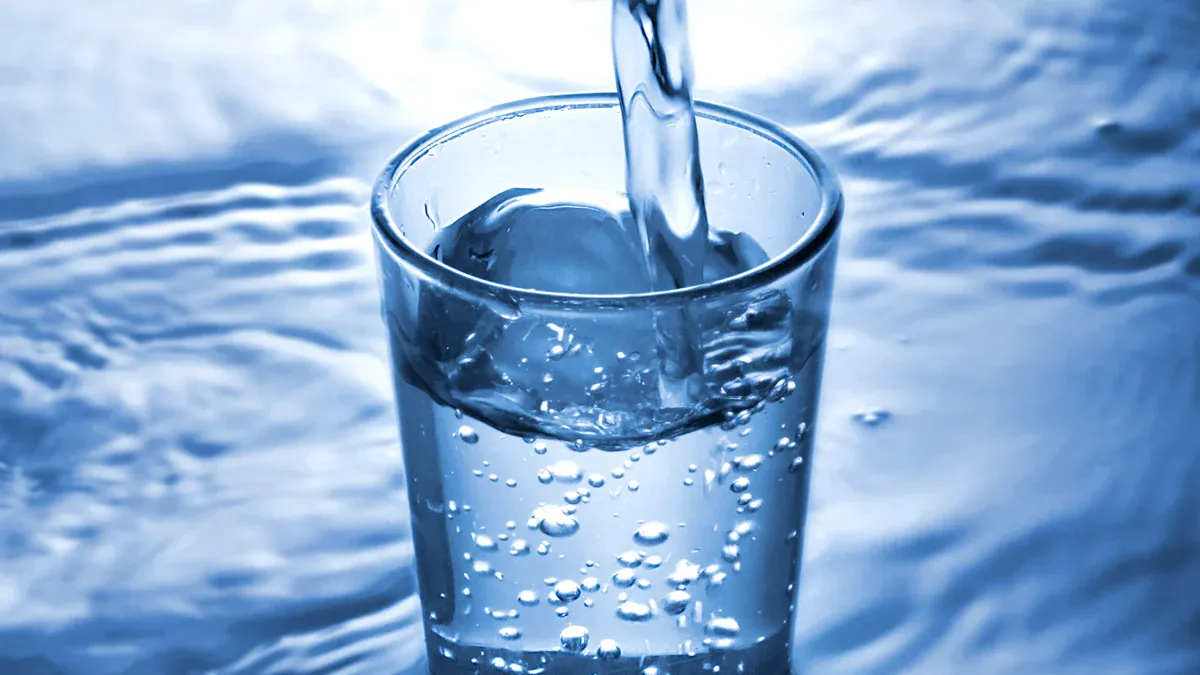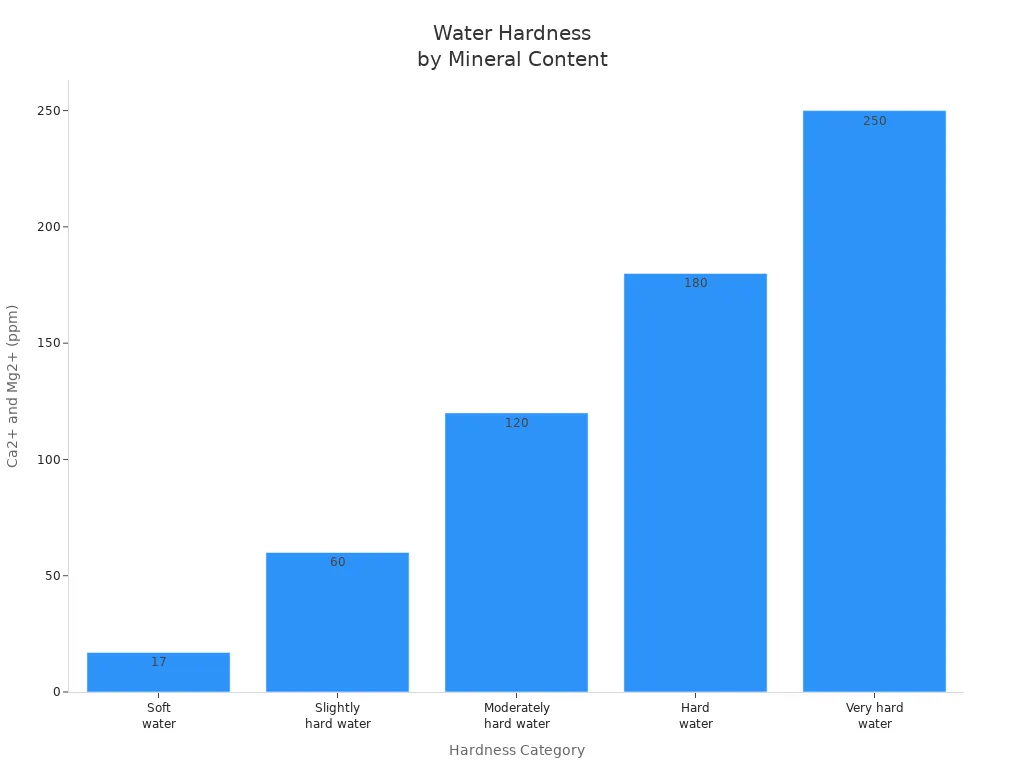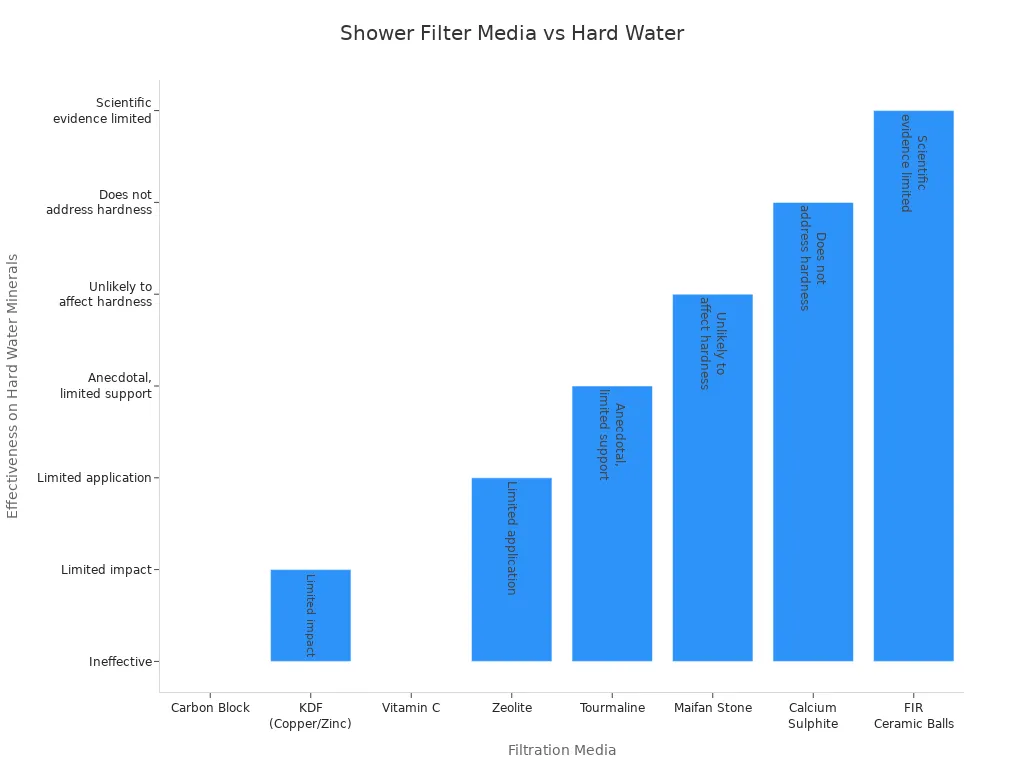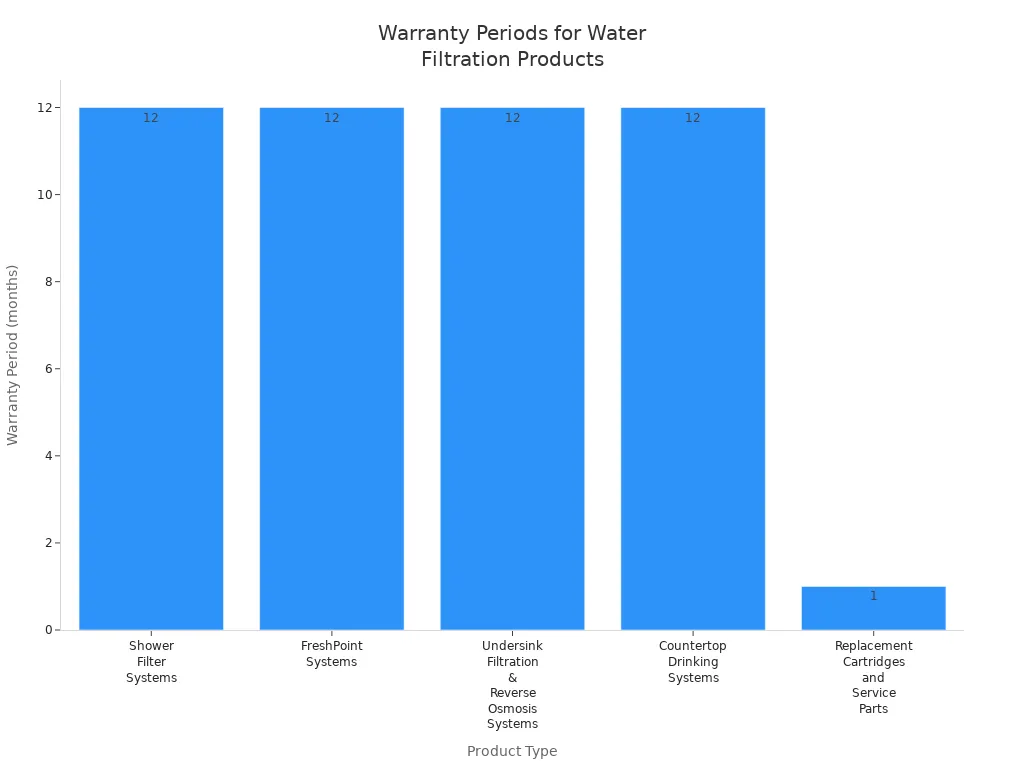Nearly 90% of homes in the United States have hard water. You might see cloudy spots on your dishes. Your skin can feel rough after a shower. Your hair may look dull and break easily. Hard water minerals can build up inside appliances. This can make your energy bills go up. It can also make appliances break sooner. Many people say their skin feels dry and itchy. They also see tough stains near sinks and faucets. A science-based solution can help protect your health and home. You can use a water softener shower head or an advanced shower filter. Pick shower filters that use proven ways to clean water. This gives you safer water in every shower.
Key Takeaways
Hard water has minerals like calcium and magnesium. These minerals can make your skin dry. They can also make your hair look dull. Hard water can build up in pipes and appliances.
A water softener shower head or a good shower filter can help. These tools take out chlorine and heavy metals. This makes your skin and hair healthier.
Hard water buildup can clog pipes. It can make your energy bills go up. It can also make appliances break sooner. Softening water can stop these problems.
Pick shower filters with strong materials like KDF-55 and calcium sulfite. These materials remove bad things from water. They help make water better to use.
Putting in a good shower filter is simple. Taking care of it is easy too. It saves you money over time. It helps keep your home clean. It also helps you live healthier.
Hard Water Basics

What Is Hard Water
You may hear people talk about hard water, but what does that mean? Hard water contains high levels of minerals, mainly calcium and magnesium. These minerals come from rocks and soil as water moves through the ground. Scientists measure water hardness by the amount of these minerals in parts per million (ppm). The more minerals in your water, the harder it is.
Here is a table that shows how experts classify water hardness:
Hardness Category |
Concentration of Ca2+ and Mg2+ (ppm) |
|---|---|
Soft water |
Less than 17 ppm |
Slightly hard water |
17 to 60 ppm |
Moderately hard water |
60 to 120 ppm |
Hard water |
120 to 180 ppm |
Very hard water |
More than 180 ppm |
The minerals in hard water include both carbonate and non-carbonate compounds. Calcium carbonate and magnesium carbonate are common examples. Other minerals like iron and zinc can also play a role, but calcium and magnesium have the biggest impact on water quality.
You can see how the mineral content changes with each category in this chart:

Common Signs
You might wonder how to tell if you have hard water at home. Look for these signs:
White, crusty buildup around faucets or showerheads
Soap scum on dishes, sinks, or bathtubs
Stains on your laundry after washing
Limescale inside pipes or appliances
Dry or itchy skin and dull hair after bathing
You can try simple tests to check your water. Shake some water with soap in a bottle. If you see few bubbles and cloudy water, you likely have hard water. Test strips from a store can also show the mineral level. For the most accurate results, a professional water test will measure the exact amount of calcium and magnesium. This helps you understand your water quality and choose the best solution for your home.
Why Hard Water Is a Problem
Effects on Skin and Hair
You may notice your skin feels dry or itchy after a shower. Hard water contains high levels of calcium and magnesium. These minerals can react with soap, leaving a film on your skin and hair. This film makes it harder to rinse away irritants. Many people with sensitive skin or conditions like eczema find that hard water makes their symptoms worse.
Hard water can increase dryness and irritation, especially if you have atopic dermatitis.
Studies show that children living in areas with hard water have a higher chance of developing eczema.
When you wash with hard water, more soap scum stays on your skin, which can lead to more itching and dryness.
Research using electron microscopes shows that hard water can make hair rougher and weaker. You may see more breakage and dullness.
Bathing with soft water can help improve your skin barrier and reduce itching.
If you want to protect your skin and hair, using a filtered shower head can make a big difference. Clean water helps you feel refreshed and supports your overall health.
Impact on Home
Hard water does not just affect your body. It also causes problems in your home. When you use water for showering, cleaning, or washing clothes, minerals start to build up inside pipes and appliances. Over time, this buildup forms a hard layer called scale.
Mineral deposits can corrode metal fixtures, causing leaks and stains.
Appliances like dishwashers, washing machines, and water heaters work less efficiently and may break sooner.
You may see chalky spots on dishes and glassware after washing.
Hard water forces your appliances to use more energy, raising your utility bills.
Tip: Installing a water softener shower head or filter can help reduce scale and protect your home. This simple step can save you money and keep your appliances running longer.
When you address hard water issues, you protect both your health and your home. Clean water in your shower and throughout your house leads to better comfort and long-term savings.
Hard Water Science
Mineral Content
You may ask why water is hard. Water becomes hard when it picks up minerals from rocks and soil. The main minerals are calcium and magnesium. These minerals are dissolved ions in the water. When you wash or bathe, these ions mix with soap. This makes a sticky layer called soap scum. Soap scum can make your skin and hair feel dry.
Mineral Responsible |
Form in Water |
Effect on Water Quality |
Additional Notes |
|---|---|---|---|
Dissolved ion |
Causes scale and soap scum, reduces appliance efficiency |
Essential nutrient |
|
Magnesium (Mg2+) |
Dissolved ion |
Similar effects as calcium, forms insoluble compounds |
Essential nutrient |
Both calcium and magnesium are good for your health. But too much of them in water can cause problems at home. Water softening helps by removing or changing these minerals. This stops buildup and helps cleaning. Some softeners use ion exchange. Others use chelation with citric acid to trap the minerals.
Scale and Buildup
Hard water leaves minerals in pipes and appliances. These minerals form a hard layer called scale. Scale is mostly made of calcium carbonate and magnesium carbonate. You can see scale as white, chalky spots on faucets and kettles.
Aspect |
Explanation |
|---|---|
Calcium and magnesium ions in hard water come out when there is too much, especially if the water is hot. They stick to pipes and equipment. |
|
Main Components of Scale |
Calcium carbonate, calcium bicarbonate, calcium sulfate, magnesium carbonate, magnesium sulfate. |
Effects of Scale |
Scale blocks water flow, raises pipe pressure, causes corrosion, and helps bacteria grow. |
Conditions Favoring Scale |
Hot water, fast or slow water flow, and too many ions in the water. |
Scale can block pipes and slow water.
Appliances like water heaters and dishwashers work less well because of scale.
You might pay more for energy and repairs.
Hard water makes soap work less, so you need to use more.
Water treatment, like softening, helps stop scale and buildup. These solutions keep your pipes and home working well.
Water Softener Shower Head Benefits

How It Works
A water softener shower head helps with hard water problems. It uses special filters to catch and remove things you do not want in your water. This makes the water feel nicer on your skin and hair.
Here is a table that explains what each filter does in a shower filter:
Filtration Material |
What It Removes |
Benefit for You |
|---|---|---|
KDF-55 |
Chlorine, heavy metals |
Softer skin, less irritation |
Calcium Sulfite |
Chlorine, heavy metals |
Fast chlorine removal |
Activated Carbon |
Sediments, odors, bacteria |
Fresher, cleaner water |
Mineral Balls |
Sediments, microplastics |
Smoother water feel |
Most water softener shower heads do not use ion exchange. They use these filters to lower chlorine, heavy metals, and other bad things. Some new shower filters use chelation or special crystals. These change how minerals act, so they do not stick to your skin or make scale. You get soft water without adding salt or chemicals.
The Cobbe DS Filter Shower Head is a great example. It uses more than half KDF-55 and calcium sulfite balls. It also has many filter layers. This design takes out up to 95% of chlorine and lowers heavy metals. The water feels gentle and fresh. The Cobbe DS Filter Shower Head keeps strong water pressure. The filter lasts for months before you need to change it.
Tip: If you want cleaner water in your shower, try a water softener shower head with good filters.
Health and Home Advantages
Using a water softener shower head or a good shower filter helps you every day. It protects your skin and hair from harsh minerals and chemicals. It also helps your home by stopping scale and buildup in your shower and pipes.
Here are some key advantages:
Your skin feels softer and your hair looks shinier because the filter removes chlorine and heavy metals.
You have less dryness and itching after showers.
You see less white buildup on your shower walls and fixtures.
Your shower head and pipes stay cleaner, so you clean less.
You save money on repairs and cleaning supplies.
The Cobbe DS Filter Shower Head gives you even more. It has five spray modes, so you can pick your favorite. The filter lasts 6-8 months, so you do not have to change it often. It fits most showers and is easy to put in.
When you look at new shower head filters and old water softeners, you see big changes. Old salt-based softeners use salt to take out minerals. They can hurt the environment by sending salty water into rivers and lakes. This can harm fish and plants. New shower filters, like the Cobbe DS, do not use salt or chemicals. They give you cleaner water and do not hurt nature.
Note: Picking a water softener shower head or shower filter helps you have better health, a cleaner home, and a safer planet.
Shower filters and shower head filters make water softening simple and good for the earth. You get cleaner water every day, right in your bathroom.
Shower Filter Technology
Filtration Methods
There are many kinds of shower filters you can pick. Each one uses different things to clean water. Some filters have carbon blocks. These trap chlorine and other bad stuff. KDF is a mix of copper and zinc. It helps take out chlorine and heavy metals. Calcium sulfite reacts fast with chlorine. This makes showers safer for your skin. Vitamin C filters break down chlorine and chloramines. Some filters use zeolite, tourmaline, or Maifan stone. But these do not have much proof for softening water.
Here is a table that shows how each filter works and how well it handles hard water minerals:
Filtration Media |
Claims |
How It Works |
Effectiveness on Hard Water Minerals |
|---|---|---|---|
Carbon Block |
Removes chlorine, organic compounds |
Adsorption on porous carbon surface |
Ineffective against calcium, magnesium |
KDF (Copper/Zinc) |
Reduces chlorine, heavy metals |
Redox reaction converting contaminants |
Limited impact on hardness minerals |
Vitamin C |
Neutralizes chlorine and chloramines |
Chemical reaction breaking down chlorine |
Ineffective for hardness minerals |
Zeolite |
Removes heavy metals, ammonia |
Ion exchange and physical adsorption |
Limited application for hardness |
Tourmaline |
Softens water, improves pH (claimed) |
Generates weak electrical charges (claimed) |
Anecdotal, limited scientific support |
Maifan Stone |
Adds minerals, balances pH (claimed) |
Releases trace minerals, adsorbs contaminants |
Unlikely to affect hardness significantly |
Calcium Sulphite |
Removes chlorine at high temperatures |
Reacts with chlorine converting it to salts |
Does not address hardness minerals |
FIR Ceramic Balls |
Softens water, improves mineralization |
Emits far-infrared radiation (claimed) |
Scientific evidence limited |

Most shower filters do not take out hard water minerals. They mostly remove chlorine, heavy metals, and chemicals. If you want less hard water minerals, use a whole-house water softener. Still, a shower filter for hard water can make water feel softer. It also gives cleaner water for your skin and hair.
What to Look For
When picking a shower filter, make sure it fits your needs. First, check the filter type. KDF, calcium sulfite, and activated carbon are good for chlorine and heavy metals. Look for NSF or ANSI marks. These show the filter is safe and works well.
Check if the filter fits your shower. Most filters fit normal showers. Some showers need special filters. Maintenance is important too. Pick a filter with easy-to-find cartridges. You should change them every 3 to 6 months for best results.
Here is a quick guide to help you pick the right shower filter:
Criteria |
Explanation |
|---|---|
Filter Type |
Choose based on water quality and personal needs. |
Certifications |
NSF/ANSI marks mean tested performance and safety. |
Compatibility |
Make sure the filter fits your shower setup. |
Maintenance & Replacement |
Check cartridge lifespan and cost. |
Water Pressure Performance |
Good filters keep strong flow rates for a better shower. |
Additional Features |
Adjustable spray, water-saving, and skin-friendly additives can help. |
Customer Reviews |
Read reviews from people with similar water. |
Ease of Installation |
Tool-free installation saves time. |
Lifespan & Cost |
Consider both the price and replacement costs. |
Tip: The best shower filter gives strong filtration, easy use, and good water pressure. New filters use many steps and smart features. This makes water cleaner and showers better.
Shower filters help you get cleaner water. They protect your skin and hair. For the best results, pick a shower filter that matches your needs and fits your life.
Choosing the Right Solution
Key Factors
Think about what you need before you pick a water solution. Some people want better water just for showers. Others want clean water in the whole house. Use this table to see the differences:
Factor |
Filtered Shower Head or Shower Filter |
Whole-House Water Softening System |
|---|---|---|
Scope of Water Quality |
Only shower water |
All water in your home |
Target Users |
People with skin or hair issues |
Families, infants, elderly, health concerns |
Budget |
Lower cost |
Higher cost |
Installation Complexity |
Easy, do it yourself |
Needs a plumber |
Maintenance |
Change filter every 3-6 months |
Less often, but more complex |
Water Quality Issues Addressed |
Removes chlorine, heavy metals, sediments |
Removes more contaminants, softens water |
Suitable Scenarios |
Renters, quick fix, limited budget |
Homeowners, long-term investment |
If you only care about shower water, use a shower filter. These are cheaper and simple to use. Pick a shower filter that works well and is tested. If you want clean water for everything, get a whole-house system. These cost more but fix more water problems.
Tip: Think about your family’s health, your money, and how much water you want to treat before you decide.
Installation and Maintenance
Most shower filters are easy to put in by yourself. You do not need special tools. Take off your old shower head and screw on the new one. Cobbe makes this even easier for you. The Cobbe shower filter comes with a hose, bracket, and filter. You do not need a plumber.
Change the filter every few months to keep it working. Look for signs like less soap bubbles, white marks, or dry skin. These mean you should change the filter. Cobbe makes it easy to swap filters. You can do it fast and alone.
Cobbe gives you a lifetime warranty and free shipping. Most brands only give one year. See how Cobbe compares in this chart:

Pick a shower filter that is easy to put in, simple to take care of, and has a good warranty. This helps you get better water and feel safe at home.
Science-Based Results
Healthier Showers
You want your shower to feel good and safe. Science says water softener shower heads can help. These shower heads use special filters like KDF-55 and calcium sulfite. They take out up to 95% of chlorine and heavy metals. Chlorine and metals can make your skin dry. They can also make your hair weak and easy to break. Using a filtered shower helps protect your skin from getting irritated. It also keeps your hair from getting damaged.
Doctors and people who use these showers agree. People with sensitive skin or eczema often feel less itchy. Their skin feels softer after using a filtered shower. A study in 2019 showed that taking out chlorine and metals makes water better. This means your skin feels smoother. Your hair looks shinier too. You also avoid harsh chemicals that can stay on your body after a normal shower.
Tip: If you want better skin and hair, try a water softener shower head. You will see and feel the change after a few showers.
Long-Term Savings
A science-based fix helps more than just your health. It also saves you money over time. Hard water causes minerals to build up in your shower and pipes. This is called scale. Scale can block water and hurt your fixtures. Research from Arizona State University shows some shower heads stop over 90% of scale. This helps your plumbing and shower last longer.
Here is how a water softener shower head can help you save:
Benefit |
How It Saves You Money |
|---|---|
Less scale buildup |
Fewer repairs and replacements |
Longer-lasting fixtures |
Lower maintenance costs |
Efficient water flow |
Reduced energy bills |
Fewer cleaning products needed |
Lower household expenses |
You spend less on fixing things and buying cleaners. Your shower stays cleaner. Your water pressure stays strong. Over time, you save more money. Picking a science-based shower head gives you comfort and saves you cash.
You protect your health and home when you choose science-based solutions for hard water. Softened water helps your skin and hair feel better after every shower. Your appliances last longer, and you save money on repairs.
A quality shower filter or water softener shower head removes harsh minerals and keeps your shower clean.
-
You use less soap and enjoy spotless dishes and laundry.
Take time to test your water. Pick a proven shower solution that fits your needs.
FAQ
What is the difference between a shower filter and a water softener shower head?
A shower filter removes chlorine, heavy metals, and some sediments. A water softener shower head does this and also helps reduce the effects of hard water minerals. You get softer water and better protection for your skin and hair.
How often should I replace the filter in my shower head?
You should change the filter every 6 to 8 months. If you notice less water pressure, more buildup, or dry skin, replace it sooner. Always follow the instructions from your product for the best results.
Can a shower filter remove all hard water minerals?
Most shower filters do not remove all hard water minerals. They mainly target chlorine and heavy metals. For full removal of calcium and magnesium, you need a whole-house water softener. Shower filters still help your skin and hair feel better.
Is it easy to install a Cobbe DS Filter Shower Head?
Yes, you can install it yourself without tools. Just unscrew your old shower head and screw on the new one. The process takes only a few minutes. You do not need a plumber.





